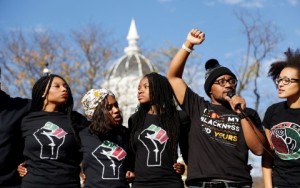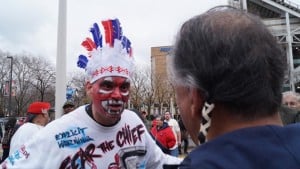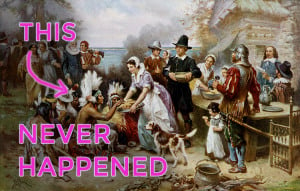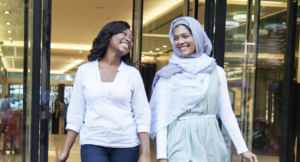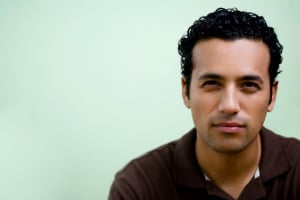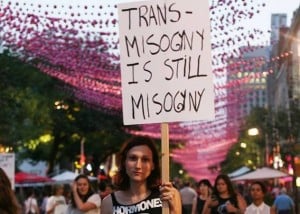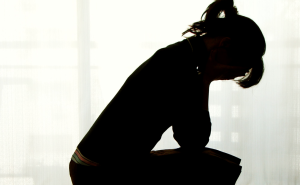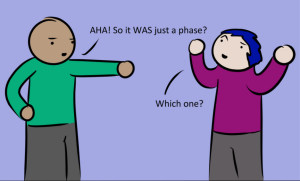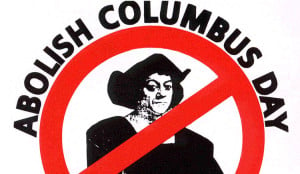What comes to mind when you think of the word “freedom?”
Personally, I think of two different things: There’s freedom as liberation, the basic human right to be your authentic self and live your life without fear of violence or persecution.
Then there’s the idea of “freedom” as a tenet of the faulty “American Dream.” You know, the kind of rhetoric spewed on media outlets like Fox News, telling us that we’re lucky to live in the US, the land of the free. Telling us who to fear – namely, Arab Muslims whose “barbaric” traditions threaten our liberties. Telling us that “political correctness” has gone awry, trying to take away our freedom of speech.
Right now, this very rhetoric is being used to ridicule activists fighting for freedom as liberation.
Here’s what’s happening. We’ve been rocked by two major events in our world.
On a global scale, the devastating attacks in Paris have left 140 people dead and many more injured and traumatized by unfathomable terror.
And here at home, activists of color on college campuses across the country are protesting having to live in fear with incidents like racist threats of violence at the University of Missouri.
It’s hard to know how to react in moments like these. I wish I could shut off the world around me and just be human. After all, it’s only human to grieve, to learn of the horrific things the people in Paris went through and mourn for the lost and shattered lives of the victims, their families, and communities.
And it’s only human to feel enraged for the students of color too afraid to step outside of their dorm rooms on a campus where the administration dismisses their fears.
I can hold both these feelings within me and know that one doesn’t diminish the validity of the other. But when it comes to expressing these emotions, every response feels heavy with implications.
Does changing your profile picture to the colors of the French flag mean you care about Western citizens, but not those who face the same violence in places like Lebanon, which was attacked just hours before Paris?
Does continuing to share news from Mizzou amount to whining about “first world problems,” instead of “real” violence?
These questions come up partly because our media is not without bias. So everything from how we get the news about world issues to how we respond has become politicized.
Which brings me to how these two events are colliding in the media now. First, conservatives used the Paris attacks to say that Mizzou activists should be counting their blessings and stop complaining – because at least they don’t have to face that kind of terrorism.
But activists haven’t complied with this misguided call to be silent. So now, conservatives are ramping up their attempt to discredit them. They’re claiming student activists are complaining that the Paris attacks are “stealing the spotlight” from their cause.
If you’re not paying attention, you might think this is true.
There are a lot of perks to online activism, like having a widely accessible virtual space to call attention to social issues. But one of the drawbacks is that the message about these issues often falls into a narrow 140-character space, and it’s easy for media figures to ignore the nuance and distort the narrative into something it’s not.
To really get the message of what the campus activists are saying, we’ve got to turn off the distortions and think critically about what’s going on.
So here’s what right-wing figures are saying about campus activists – and why you shouldn’t fall for the lies.
1. ‘Campus Activists Don’t Care About the People of Paris’
If you think campus activists are incapable of caring about multiple things at once, then you clearly haven’t spent very much time with any of them.
There are students all over this country juggling school with work, with parenting, with extra curricular activities, and more. Adding social justice work to that list doesn’t take away their ability to give attention to the others.
In the same way, it’s absurd to think that drawing attention to racial injustice on campus means activists don’t care about the suffering in Paris.
The difference is that they’re not allowing the mainstream media to dictate and limit their capacity for compassion.
From Facebook flag options to top news stories, the media message is clear: We should care about the victims of the Paris attacks more than anyone else. More than the victims of our own nation’s War on Terror, more than the Black and Brown people being targeted and killed by our own police force.
Challenging this message doesn’t mean saying that the victims in Paris don’t matter. If anything, we’re telling the media to give us more credit. We recognize the gravity of the horrific attacks in Paris. We can honor the victims there and still understand the weight of other issues of violence without trivializing any of them.
We don’t have to shut down our ongoing efforts to build a better world in order to show we care.
And let’s be real: Using the deaths of the victims in Paris just to discredit US activists isn’t about honoring the lives lost, and it’s deplorable to pretend that it is.
2. ‘US Students Are Comparing Their Experiences to the Terror in Paris’
People are also chastising campus activists for using words like “terrorism” to describe racist threats and harassment at school.
“True terrorism,” these folks would argue, shows up in the form of suicide bombers from the Middle East – and these students just don’t know how good they have it.
This argument is influenced by the mainstream media. They’ve made it clear that the word “terrorist” is reserved for Arab people who attack Westerners. They’re quick to draw connections between any brown-skinned person suspected of violence and Islam (even though terrorists do not represent Islam). They tell us these are the people who are after our freedom, the ones we should fear.
But the truth is, the terrorists who post the biggest threat are the ones in our own country.
Violent white men who proudly identify with right-wing conservativism, Christian extremism, white supremacy, and misogyny are the ones responsible for most of the incidents of mass violence in the US.
The fact that the media reserves the “terrorist” label for Arab Muslims is a sign of a racist and Islamophobic bias.
If they were really concerned about terrorism, they’d be more likely to conflate the KKK with all of Christianity than to characterize Muslims as terrorists.
It’s no exaggeration for activists of color to say we’re being terrorized in our schools, our churches, our own homes.
It’s the truth. And denying that truth means invalidating what it means to be a person of color in the United States.
This isn’t a matter of comparing the experiences of US college students to those of international terror victims, saying that two incidents of terror are the same or that the students have it worse.
As DeRay McKesson pointed out, it wasn’t the activists who brought up the comparison in the first place – it was racists who disgustingly used the tragedy in Paris to tell activists to shut up about the violence in their own lives.
3. ‘Activists Are Complaining That Paris Is Stealing Their Attention’
If you were following certain blogs, you might get an image of campus activists as spoiled children throwing tantrums because the Paris attacks are stealing their media spotlight.
That’s not what’s happening.
What activists are really doing is calling for us to pay attention to how the media selects and frames the issues it covers.
Most of the time, the media doesn’t tell us the whole story – so we need to dig for the truth by thinking critically about what they’re telling us.
To be clear, I don’t believe there’s any such thing as too much grief, of taking too long to mourn the lives lost in an undeniably tragic incident of violence. So this isn’t about saying we shouldn’t be honoring the Paris victims, in the media and elsewhere.
But there’s a notable difference when all hearts are with Paris, but not Beirut, not for similar attacks in other places like Afghanistan, Kenya, or Syria. Though there were attacks elsewhere on the very same day, time stopped for Paris. People even got angry at attempts to remember other victims, saying that it was France’s day for mourning.
I’ve heard many reasons for this – that we’re more “used to” violence happening elsewhere, that France is our ally. Maybe it’s just natural to be more shaken by an attack where we wouldn’t expect it. But it’s also no coincidence that we’re more willing to identify and grieve with victims in a Western country.
The media plays a big role in othering Arab Muslims, to the point where violent people attack anyone who they even believe to be Muslim, like Sikhs, after incidents like 9/11. That shows just how little people understand about Islam, and how they’ve been led to characterize anyone with brown skin as the enemy.
When you carry such xenophobic ideas, you’re desensitized to violence against people in countries you think of as exotic, as “other.”
In the same way, the media criminalizes Black Americans, to the point where the public even judges children who are victims of racist violence as older and more guilty than their white peers. We’re dehumanized, and the fear of the “other” hurts us, too.
So of course activists are calling on us to think critically about what we see and hear in the news. Just as the media rightfully recognizes the grief and fear of the residents of France, they should give time to people here in the US, speaking up about the fear they live with.
We rely on institutions like school and the media to educate us. When they’re pointing us toward oppression instead, we deserve to demand better.
4. ‘These Activists Are Spoiled – They Have Nothing to Worry About’
It’s so dangerous to follow the mainstream media’s narrative about whose lives we should care about, because that leads to racist and xenophobic perspectives on the world.
That narrative also leads people to dismiss the valid concerns of activists of color in the US. They say activists are oversensitive, hostile, and overreacting to “first world problems.”
As Jezebel Delilah X wrote, this is political gaslighting, telling “students of color – and all systemically targeted people for that matter – that if we aren’t being bombed, individually executed, or held hostage, then we aren’t experiencing real violence.”
But if we’re only looking at what’s happening “over there,” in other countries, at the hands of people we’re taught to think of as “other,” we’re missing something big.
We’ve got to pay attention to the way our own government and institutions contribute to the problems in other countries through Western imperialism, and the way they uphold systems of violence attacking the very people in the US they are supposed to protect.
That American Dream idea of “freedom” – the one that says we can all work hard and pull ourselves up by our bootstraps – is failing miserably as long as students of color are denied safety and dignity on their campuses.
So often when people of color speak about our experiences with oppression, we have white folks deny that our experiences were hurtful or racist, or doubt that they even happened at all.
It’s frustrating and insulting. And it also leads us to have to agitate and organize in order to have any chance of surviving and succeeding in an academic career.
There’s a long history of on-campus organizing that has created vital results like ethnic studies departments and programs that look out for the needs of students of color. These programs are essential for students of color on campuses where they’re often profiled as trespassers and treated like they’re unintelligent.
But it often takes fighting through community organizing to build and preserve them. Protests all around the country show how sadly widespread racism on campus is, with one college administrator responding by saying students of color don’t fit the “mold.”
This is institutional oppression – and it may not look like a bomb, but it is a violent force. We’re capable of recognizing multiple forms of violence. And we have to recognize and address it, or it will remain invisible and unchecked all around us.
***
Last Friday, November 13, was a difficult day all around the world. On top of everyday incidents of oppression, there were also natural disasters and mass murders. My hopes for healing are going out to the whole world right now.
There’s no need to play Oppression Olympics or say that any victims deserve our thoughts more than any others.
I don’t know about you, but after a dark day like that Friday, I’m more than ready to build a world where everyone is free to live without fear. As with all social issues, stopping violence is a matter of getting to the root causes.
We have to challenge those structures and systems shaping our society, thinking critically about our media, our government, our academic institutions.
With true liberation, our voices – the voices of the people – should be heard. For our lives, our safety, our dignity, freedom is worth fighting for.
[do_widget id=’text-101′]
Maisha Z. Johnson is the Digital Content Associate and Staff Writer of Everyday Feminism. She is also an apprentice editor with Black Girl Dangerous and a blogger for Pyragraph, and she facilitates empowerment groups with incarcerated women as part of Fired Up!, a program of California Coalition for Women Prisoners. Through her own project, Inkblot Arts, Maisha taps into the creative arts and digital media to amplify the voices of those often silenced. Read her blog or follow her on Twitter @mzjwords.
Search our 3000+ articles!
Read our articles about:
Our online racial justice training
Used by hundreds of universities, non-profits, and businesses.
Click to learn more


